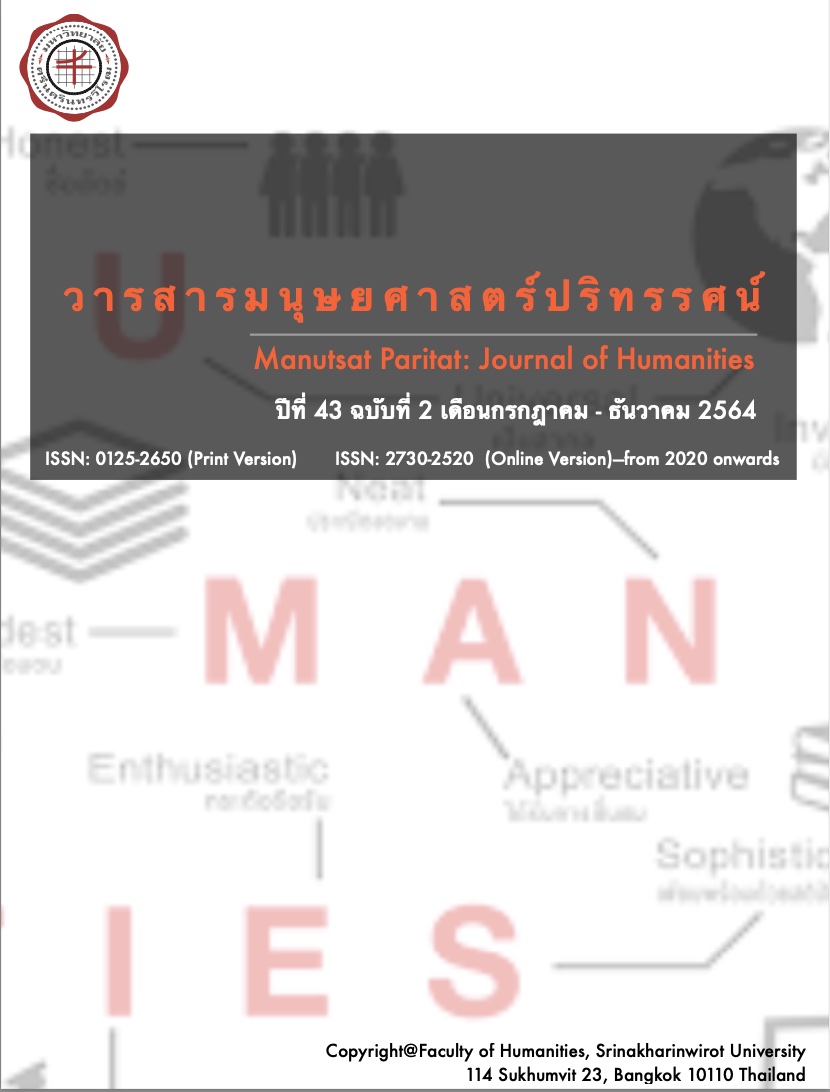Word Formation and Meanings of English Words Related to the Coronavirus Disease 2019 Pandemic
Main Article Content
Abstract
This article aims to analyze the word formation in English occurred in the period of the Coronavirus Disease 2019 outbreak and appeared in the social media in Thailand. It also categorizes the semantic domains of those words. The frameworks applied in the study are morphology and semantics in the field of linguistics. The study also provides some remarks on the use of some words by referring to the political correctness in the field of sociolinguistics. The findings reveal six processes of word formation: compounding, borrowing, derivation, blending, acronyms, and multiple processes. They are already used in the English language, which have more specific meanings in this pandemic context. The meaning extension is under both metaphor and metonymy processes. Those words found can be categorized into 10 semantic domains: behavior, prevention, equipment, diagnosis, people, place, spread, names of vaccine, names of COVID-19, and symptoms and diseases due to the pandemic. The findings also show that even letters can be used in order to lessen stigma and accusation on others or specific groups of people.
Article Details
Any unauthorized copying, publication, reproduction or distribution of copyrighted works appeared in Manutsat Paritat: Journal of Humanities is an infringement of the copyright owners’ rights. To authorize the copying, publication, reproduction or distribution of copyrighted works to be appeared in other printed materials or any online media, please write to MPJHthaijo@gmail.com for permission.
References
Andrews, E. (1996). Cultural Sensitivity and Political Correctness: The Linguistic Problem of Naming. American
Speech, 71(4), 389-404.
Bryce, A. (2020, May 14). Constant Zoom calls are worsening people’s body dysmorphia.
https://metro.co.uk/2020/05/14/constant-zoom-calls-are-worsening-peoples-body-dysmorphia- 12697948/
Butar, B. P. B. (2021). The Word Formation and Semantic Domains in COVID-19 Sections in WHO Website.
Yogyakarta: Department of English Letters, Faculty of Letters, Universitas Sanata Dharma.
Encyclopedia Britannica Inc. (2021). https://www.britannica.com/topic/political-correctness
Fernstrom, M. (2021, May 18). What is Covid 'cave syndrome' — and how to fix it.
https://www.nbcnews.com/know-your-value/feature/what-covid-cave-syndrome-how-fix-it-ncna1267630
Fromkin, V., Rodman, R., & Hyams, N. (2017). An introduction to language (11th ed.). Boston, MA: Cengage.
Gohd, C. (2020). Russia names its 1st COVID-19 vaccine ‘Sputnik V’ after space race triumph.
https://www.space.com/russia-names-coronavirus-vaccine-sputnik-v.html
Infotagion. (2020). Factcheck: Does Covid stand for ‘Chinese Originated Viral Infectious Disease’?.
https://infotagion.com/factcheck-does-covid-stand-for-chinese-originated-viral-infectious-disease/
Merriam-Webster. (2021). https://www.merriam-webster.com/dictionary/curfew
Ramachandran, V. (2021, February 23). Stanford researchers identify four causes for ‘Zoom fatigue’ and their
simple fixes. https://news.stanford.edu/2021/02/23/four-causes-zoom-fatigue-solutions/
Ratanakul, T. (2018). เหตุใดเธอจึงไม่ยอมฉีด? ที่มาของความกลัววัคซีน สู่ ‘ลัทธิต่อต้านวัคซีน’.
https://thematter.co/science-tech/history-of-anti-vaccine/63544
Roger, Kristen. (2020, March 19). Do I have ‘cabin fever?’ What it is, how to ‘cure’ it.
Simatupang, E. C., & Supri, I. Z. (2020). Compound words that occur during the global pandemic covid-19: A
morphosemantic study. English Review, Journal of English Education, 8(2), 291-298. doi: 10.25134/erjee.v8i2.2824.
Thai PBS. (2564). Hospitel คืออะไร. https://covid19.thaipbs.or.th/faq/?post=25645
UNICEF (2020). Physical not social distancing. https://www.unicef.org/sudan/press-releases/physical-not-social-
distancing
World Health Organization. (2021, June 15). Tracking SARS-CoV-2 variants.
https://www.who.int/en/activities/tracking-SARS-CoV-2-variants/
Yule, G. (2006). The study of language (3rd ed.). Cambridge: Cambridge University Press.


